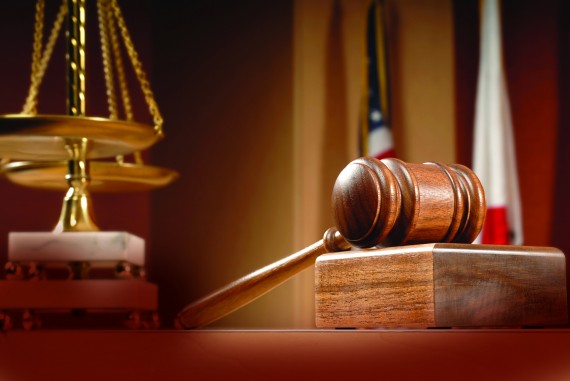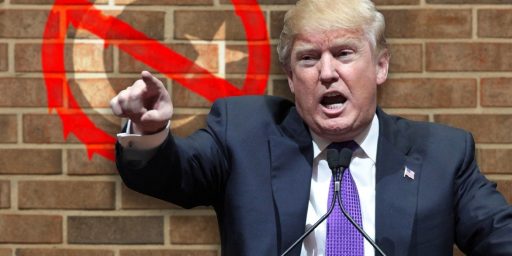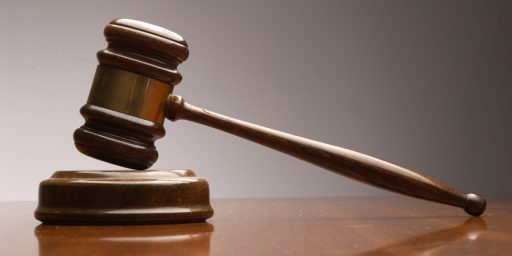Ninth Circuit Hears Argument In Muslim Travel Ban Case
Another day in Court for President Trump's Muslim ban.
Yesterday, attorneys for the Trump Administration and the State of Hawaii argued in front of a panel of judges from the Ninth Circuit Court of Appeals regarding the President’s revised Executive Order barring travel from six majority-Muslim countries:
WASHINGTON — Three months after the federal appeals court in California blocked President Trump’s first travel ban, a three-judge panel of the same court heard arguments on Monday in a challenge to Mr. Trump’s revised ban, this one limiting travel from six predominantly Muslim countries.
Mr. Trump views the appeals court — the United States Court of Appeals for the Ninth Circuit — as a hostile forum, frequently criticizing it on Twitter. But the judges hearing Monday’s arguments asked probing questions of both sides and may not be ready to endorse the sweeping reasoning of a federal judge in Hawaii who blocked major parts of the revised order.
The appeals court judges, all appointed by President Bill Clinton, barely tipped their hands, but they did say they recognized that the dispute before them was momentous. The argument was held in Seattle and broadcast live on C-Span.
“This court is very well aware of the importance of this case,” Judge Ronald M. Gould said at the outset.
In making the administration’s case, Jeffrey B. Wall, the acting United States solicitor general, urged the court to ignore campaign statements from Mr. Trump concerning his intention to issue a “Muslim ban” and focus instead on the terms of the revised executive order.
“The order on its face doesn’t have anything to do with religion,” he said.
Judge Michael Daly Hawkins asked whether Mr. Trump had ever disavowed his campaign statements.
Mr. Wall responded that “over time the president clarified that what he was talking about were Islamic terrorist groups and the countries that shelter or sponsor them.”
But Neal K. Katyal, a lawyer for Hawaii, which is challenging the revised order, said that Mr. Trump’s campaign website until very recently continued to feature a 2015 news release that said “Donald J. Trump is calling for a total and complete shutdown of Muslims entering the United States.”
That document, Mr. Katyal said, “just happened to disappear moments before the Fourth Circuit argument last week.”
On May 8, a 13-judge panel of the United States Court of Appeals for the Fourth Circuit, in Richmond, Va., heard arguments in a separate appeal of an order blocking part of the revised travel ban, that one from a federal judge in Maryland.
Judge Richard A. Paez asked Mr. Katyal whether Mr. Trump “is forever barred from issuing an executive order along these lines.”
Mr. Katyal responded that a revised order might be proper if Congress enacted new legislation authorizing it, if Mr. Trump explicitly disavowed his earlier statements or if he described Islam in the positive terms that President George W. Bush used after the Sept. 11 attacks.
Mr. Wall argued that the Constitution and the immigration laws give the president vast authority to make national security judgments about who may enter the country. The role of the courts, he said, was limited to determining whether the government had a “facially legitimate and bona fide reason” for taking action.
Late in the argument, Judge Hawkins asked Mr. Katyal, “Why shouldn’t we be deferential to the office of president of the United States on these issues?”
“That’s the million-dollar question,” Mr. Katyal said — and he added that the First Amendment’s ban on government establishment of religion supplied the answer.
“Is this executive order, viewed from the standpoint of an objective observer, an establishment of a disfavored religion, Islam?” Mr. Katyal asked. The answer, he said, was yes.
Mr. Trump issued his initial order on Jan. 27, a week into his presidency. Less than two weeks later, a different three-judge panel of the Ninth Circuit affirmed an order halting it.
(…)
Much of Monday’s argument concerned how to reconcile two parts of the immigration laws.
One provision allows the president to “suspend the entry of all aliens or any class of aliens as immigrants or nonimmigrants” if he determines that their entry “would be detrimental to the interests of the United States.”
But another provision appears to limit that power, saying that “no person shall receive any preference or priority or be discriminated against in the issuance of an immigrant visa because of the person’s race, sex, nationality, place of birth or place of residence.”
Mr. Wall said the second provision would at most require the issuance of visas to people who could nonetheless still be barred at the border.
Judge Hawkins said that “would be like Tom Hanks at the airport,” apparently referring to “The Terminal,” a 2004 film about a man stranded at Kennedy Airport.
Zoe Tillman at Buzzfeed has more:
Acting Solicitor General Jeffrey Wall, who argued the case this past week in the Fourth Circuit, once again faced an array of questions about how much the judges should consider Trump’s statements during the presidential campaign in support of a ban on Muslim immigration, as well as statements by the president and his advisors about the purpose of the travel ban executive order after he took office.
“The executive order sets out national security justifications. But how is a court to know if in fact it’s a Muslim ban in the guise of national security justification?” Judge Ronald Gould asked Wall.
Wall pointed to a previous US Supreme Court case that said courts couldn’t look behind certain immigration-related decisions if, on their face, they presented a legitimate purpose and the government’s actions had a rational relationship to that purpose. The travel ban executive order doesn’t mention Islam, and the administration has repeatedly denied that it’s a Muslim ban.
“The benefit of that standard … is it doesn’t call on courts to make these sorts of determinations, the second-guessing of national security determinations that they’re sort of ill-equipped to do, Wall said.
During one of the more heated exchanges, Judge Richard Paez asked if President Franklin Roosevelt’s executive order during World War II authorizing the internment of Japanese Americans would “pass muster” under the government’s arguments in the travel ban case. When Wall replied that it would not, Paez pressed him, noting that Roosevelt’s order was “facially legitimate.”
“I want to be very clear about this: This case is not Korematsu, and if it were, I wouldn’t be standing here and the United States would not be defending it,” Wall said.
Wall was referring to a now-widely disavowed decision by the Supreme Court in 1944, Korematsu v. United States, which upheld Roosevelt’s executive order. The lawyer who argued in the Ninth Circuit on Monday for the challengers, Neal Katyal, made a public statement in 2011 when he was the acting US solicitor general highlighting mistakes by that office in defending Roosevelt’s order in the Korematsu case.
Paez pushed back, asking Wall how the government would apply the “facially legitimate” standard it was arguing in the travel ban case to an order such as Roosevelt’s one, which didn’t explicitly reference Japanese Americans. Wall said he wasn’t familiar with the details of the order, but he couldn’t imagine a court saying it would survive under the standard the government was asking the court to apply.
(…)
Paez asked several questions that signaled possible concern about relying too much on Trump’s campaign statements, which the challengers cited in arguing their constitutional claim. At one point, Paez asked Katyal if the challengers could still win the case if the court didn’t consider the campaign statements. Katyal said Trump had said and done enough after becoming president to back up their claim that the order amounted to religious discrimination.
Paez, echoing questions from the Fourth Circuit last week, had also asked if Trump’s comments meant he could never adopt an executive order along the lines of the one he signed. Katyal responded that if Trump took steps to distance himself from the Muslim ban comments, such as explicitly disavowing them or making a clearer connection to national security threats, he could.
“Our constitution and laws are better than this,” Katyal said. “Our founders wanted America to be a beacon on our coast, and that beacon at the end of the day is not the quality of our sports teams, or the quality of our soil, that beacon ultimately is the majestic Article III and the grand contours of the First Amendment.”
As is always the case, one must exercise caution in trying to determining what a Judge might be thinking or how a case might be decided based on oral argument because it is frequently the case that oral argument, and the questions that Judges ask don’t exactly correspond with what direction they might actually end up and may not accurately reflect their impressions of the case based on the briefs they’ve read. Notwithstanding that caveat, though, and pretty much in line with last week’s arguments before the full Fourth Circuit Court of Appeals, it appeared as though the Judges on this panel were far more skeptical of the Federal Government’s position defending the ban than they were of the argument against it presented by Hawaii and the other Plaintiffs. For example, all three Judges spent a considerable amount of time on the question of what, if any, evidence the government has presented establishing that the nations covered by the ban were, in fact, the sources of threats to the United States significantly different from those faced by majority-Muslim nations not covered by the ban. As I’ve noted before, among the nations exempt from the ban are Egypt, Pakistan, Saudi Arabia, and the United Arab Emirates. Each of these nations has been the source of people who have come to the United States to commit terrorist attacks, including the September 11th attacks which consisted mostly of perpetrators from Egypt and Saudi Arabia. As in previous cases, attorneys for the government took the position that the government didn’t need to provide any supporting evidence and that courts should give deference to the judgment of the President, an argument that hasn’t gone over well with the Judges that have presided over other cases involving the two Executive Orders that have been issued regarding this matter.
Just as in the Fourth Circuit argument last week, a major part of the discussion between the attorneys for both side and the Judges concerned the extent to which President Trump’s rhetoric as a candidate and the statements made by certain aides and adviser should be considered by the Court in examining the Executive Order. At issue, of course, is the fact that Trump spent much of the Presidential campaign promising a “complete and total shutdown” of all Muslim immigration. That appeared to change after he became President, however, and he ended up issuing Executive Orders that covered only certain nations, albeit ones that are overwhelmingly Muslim. At the same time, when the first order was issued, Rudy Giuliani and others close to the President said publicly that the President issued the order he did because he was searching for a way to ban Muslim immigration and that the “national security” argument is little more than a ruse to legitimize a policy that would otherwise be wholly illegitimate and illegal. Previous courts that have ruled on the travel ban have found that the President’s initial announcement of a “Muslim ban” in December 2015, as well as the comments of people such as Giuliani, and in nearly all the cases they have found that it was entirely proper to look behind the words of the Executive Order in this manner. Nearly all of the courts that have ruled this way have also found the evidence to overwhelmingly show that the actual intent of the orders was to ban Muslims from entering the country rather than to address any actual security concerns. If these Judges agree with that, then it seems likely that they’ll rule to keep the nationwide stay against enforcement of the order in place.
As with the Fourth Circuit, it’s unclear when we will see a ruling from these Judges, but they did note at the conclusion of the arguments that this case is one that requires prompt attention so I suspect it will be sooner rather than later. In any case, it’s likely that the matter will head to the Supreme Court regardless of which side is victorious at this stage.
Here is video of yesterday’s hearings if you’re interested:





The original executive order was a 90 travel ban so that vetting could be improved. It’s been over 90 days, so why do Trump’s attorneys think we need the ban now? Don’t bother answering that question, I know it’s all BS.